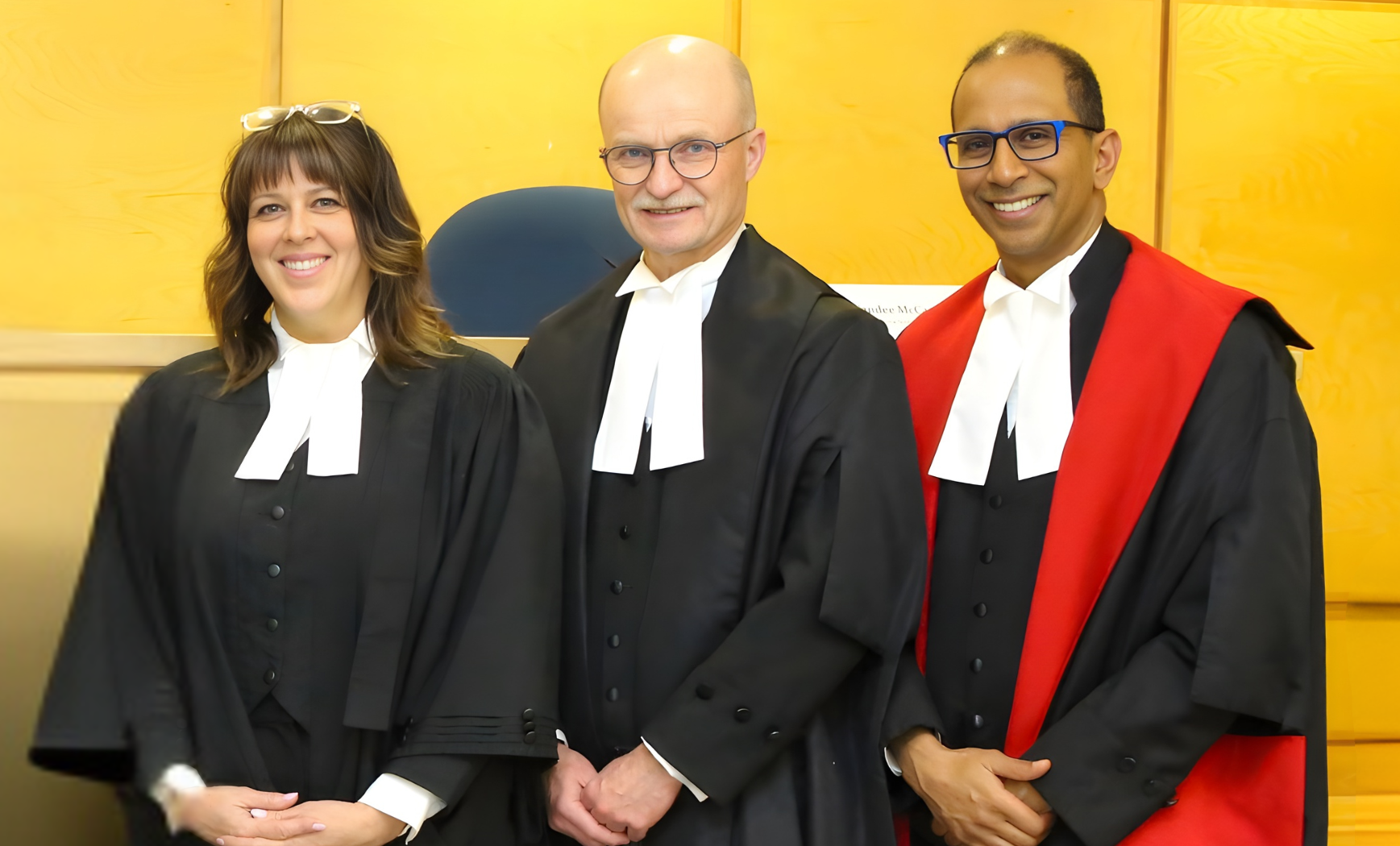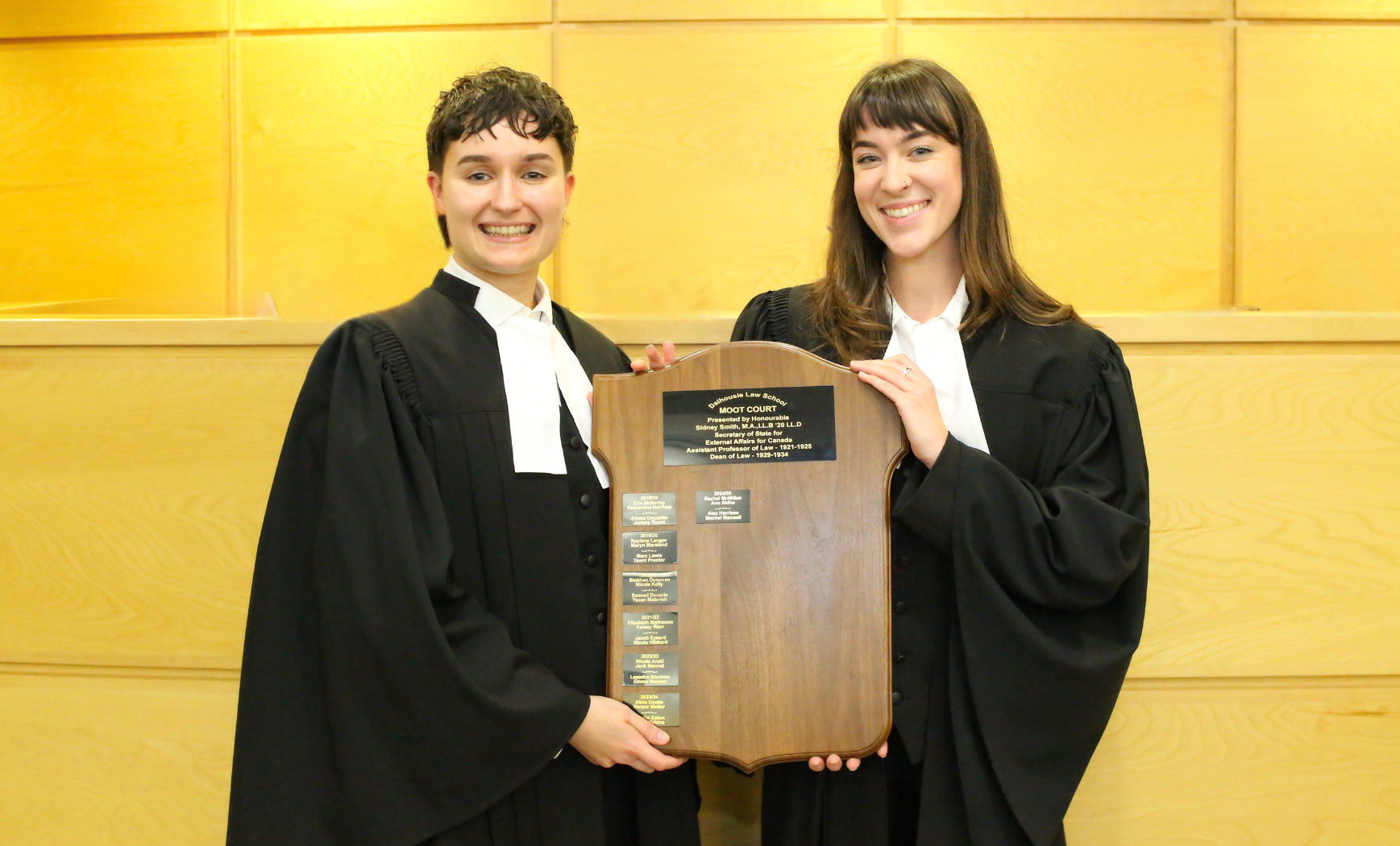News
» Go to news main2025 Smith Shield Moot Results

Nearly 100 students, faculty, and guests gathered at the Weldon Law Building for the 2025 Smith Shield Moot on Monday, November 17, 2025. With a tradition dating back to 1927, Smith Shield competitors are chosen from the top mooters in the compulsory second-year moot.
This yearâs mooters, Shawn Courtney, Sophia King Gillis, Maryjane Sexton, and Julie Tremblay, argued the case ofÌıR. v. Brown from the Nova Scotia Court of Appeal beforeÌıthe Honourable Chief Justice Michael J. Wood, Nova Scotia Court of Appeal; the Honourable Justice R. Lester Jesudason, Supreme Court of Nova Scotia (Family Division); and Candee McCarthy, first vice-president of the Nova Scotia Barristersâ Society. Courtney and Sexton represented the appellant, the Crown; while King Gillis and Tremblay represented the respondent, Jerry Brown.
The competition focused on a case involving a Mr. Big operation, a Canadian police technique by which a suspect is drawn into a fictitious criminal organization to secure a confession. Schulich Law Associate Professor Adelina Iftene, who also coordinates the law schoolâs specialization in criminal justice, served as coachÌıand drafted the problem.
 (L-R): Moot judges McCarthy, Wood, and Jesudason (Photo by Bruce Bottomley)
(L-R): Moot judges McCarthy, Wood, and Jesudason (Photo by Bruce Bottomley)
Ìı
Both in the case law and the literature on Mr. Big operations, several concerns have been raised regarding the technique, primarily its reliability and the spectre of false confessions, and the legitimacy of state action that effectively coerces a suspect into confessing, particularly if that involves oppressive conduct or the subversion of the suspectâs rights.
âMr. Big operations have been a focus of my research, so I wrote the problem around the admissibility of a murder confessionÌıobtained during such an operation,â says Iftene. âI wanted the problem to be interesting and engaging for the students, the judges, and the audience. At the same time, I sought to raise jurisdictional and evidentiary issues that would transcend the narrowÌıconfines of undercover operations while allowing the mooters to expand their legal knowledge.â
According to the case, on the early morning of July 7, 2021, Jerry Brown walked into a police station in Halifax and reported that he had found his grandmother, with whom he had been living for the past two weeks, dead in her house. The postmortem examination showed that she had been brutally beaten to death with an instrument that was consistent with a hammer. Police arrested Jerry and charged him with her murder. While he was the only suspect, he maintained his innocence. The RCMP ran a Mr. Big operation where undercover officers infiltrated Jerryâs life, gained his trust, and eventually had him confess to Leaâs murder.
At the criminal trial, the judge applied the two-prong test in R v Hart (2014 SCC 52) to determine the admissibility of the confession. For the first prong, the judge found that the Crown did not discharge its burden of proving that the probative value of the confession outweighed its prejudice. For the second prong, the judge found that, based on the evidence presented by the defence, there was likely an abuse of process. As a result, the confession was excluded, which in turn led to an acquittal.
The Crown appealed to the Nova Scotia Court of Appeal, claiming that the judge erred in his assessment of the admissibility of the confession on both prongs and that the confession should have been admitted.
The Supreme Moot Court of Dalhousie was asked to determine whether the Nova Scotia Court of Appeal erred twice in its findings â by upholding the trial judge's determination on the question of admissibility of the confession, as well as by upholding that the case was not open to appellate review.
 (L-R): Tremblay and Sexton (Photo by Bruce Bottomley)
(L-R): Tremblay and Sexton (Photo by Bruce Bottomley)
Ìı
The winners of the 2025 Smith Shield Moot were Maryjane Sexton and Julie Tremblay, who received the A.S. Pattillo Prize in Advocacy. The runners-up were Shawn Courtney and Sophia King Gillis, who were recognized with the Leonard A. Kitz Prize in Advocacy. Lauren Marval served as this yearâs alternate.
âThe mooters were fabulous. They worked very hard, and they were incredibly well-prepared,â says Iftene. âAll four displayed impressive advocacy skills and an outstanding ability to think on their feet.âÌı Ìı
Tremblay says it meant a lot to them to represent Schulich Law alongside their classmates in the Smith Shield.ÌıâProfessor Iftene put together a great problem for us, and so many staff members contributed their time to prepare us and organize the event,â they share. âIt's been amazing competing with and against such strong advocates â I feel so proud to be counted among them.â
Sexton credits the âwonderful Weldon communityâ with helping her gain the skills and confidence required of a Smith Shield competitor, an opportunity that she never imagined sheâd be selected for just a few years ago. âGetting to work with Professor Iftene and my fellow mooters was such a pleasure,â she says. âTheir guidanceÌıthroughout this process was invaluable; I simply could not have done this without them.â
Courtney remembers watching the Smith Shield Moot when he was a 1L and thinking, âWow, I really want to do that when I get to 3L,â but he struggled with imposter syndrome and doubted whether he even belonged in law school. âParticipating in the Smith Shield this year showed me that if you can push past self-doubt and embrace opportunities, youâll find that you truly belong in this profession.â
King Gillis is grateful for everything she learned. âEach judge pushed me out of my comfort zone in a different way and asked questions I hadn't encountered yet. It was fascinating to hear which issues they were most curious about, consider their concerns, and reply within the scope of my argument.â
A special thank you to the judges, volunteers, faculty, staff, and supporters who contributed to making this year's event a pilipiliÂş». The Schulich School of Law looks forward to continuing the tradition next year!
Ìı
Recent News
- Assistant Professor Anthony Rosborough ft in "Independent auto shops push for rightâtoârepair law"
- Learning the Ropes
- Professor Emeritus Wayne MacKay ft in "We're a region steeped in Loyalist tradition. Does the arrest of a royal change that? Is it time for the Maritimes to rethink the Crown?"
- Dalhousie Legal Aid Service Community Legal Worker Sydnee Blum ft in "This tenantâs fight against a renoviction is heading to N.S. Supreme Court"
- Professor Emeritus Wayne MacKay ft in "Billionaire And Former Russian Oligarch Seeks $350 Million From Canada At International Tribunal"
- Schulich Law Students Win 2026 National Labour Arbitration Competition
- Professor Elaine Craig ft in "Examining Canada's sexual assault laws ââ and the society surrounding them"
- Professor Emeritus Wayne MacKay ft in "Former IWK CEO released from jail as she appeals fraud conviction"
